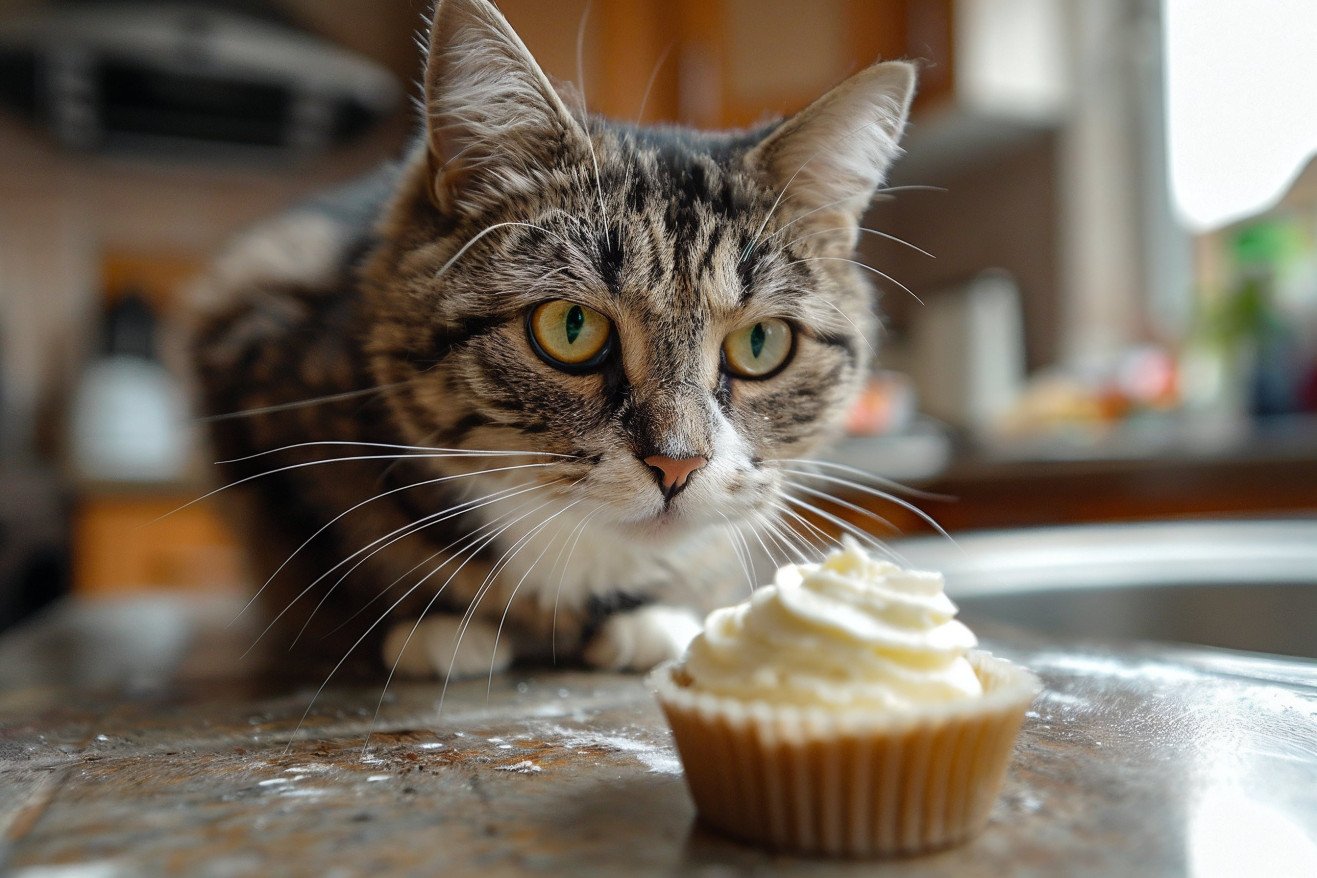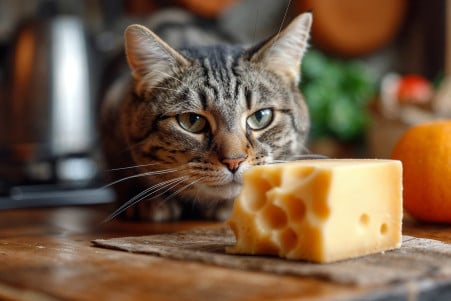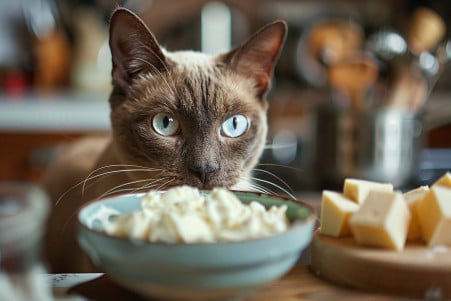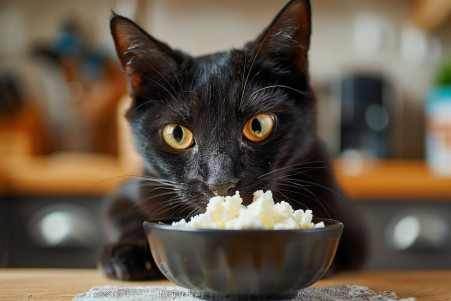Can Cats Eat Cream Cheese? Understanding Feline Lactose Tolerance
20 February 2024 • Updated 18 February 2024

For many people, cream cheese is a kitchen staple, but can you share it with your cat? While cats can technically have a little bit of cream cheese, most cats are lactose intolerant, which can cause digestive issues. Since cream cheese doesn’t offer any nutritional value to cats, it’s best to avoid giving it to them or only give it to them as an occasional, small treat.
To give you a complete answer, we’ve looked into veterinary opinions and nutritional research to get into the nitty-gritty of what cats need in their diets. We want to help close the gap between the seemingly irresistible nature of cream cheese to cats and the science behind their lactose tolerance and nutritional needs.
By looking at what pet nutrition professionals agree on, we hope to give you the information you need to make the best choices for your cat’s diet.
Can cats eat cream cheese?
Cream Cheese Doesn’t Meet a Cat’s Nutritional Needs
Knowing what cats need to eat is important for keeping them healthy and happy. Cats are obligate carnivores, which means they must eat a diet that includes certain nutrients that are only found in animal products.
This includes a diet that’s high in protein and low in carbohydrates, and it also means that the diet must include specific amounts of vitamins, minerals, and amino acids that are essential to the cat’s health, according to as emphasized by the Cornell University College of Veterinary Medicine.
Because it’s a dairy product, cream cheese is not a good fit for a cat’s diet. Not only is it high in fat, but it also lacks the essential animal-based nutrients that cats need. According to VCA Animal Hospitals, dairy products are not necessary for cats, and they can also cause digestive problems because many cats are lactose intolerant and lose the ability to digest the milk sugar lactose as they mature.
In addition, the Purina Institute points out that plant-based and dairy foods don’t contain the nutrients that cats need, including taurine and preformed vitamin A.
As a result, it’s recommended that dairy be removed from a cat’s diet or at least limited in their diet. Instead, feeding cats high-quality, meat-based diets that meet their carnivorous dietary needs will help ensure that they stay healthy. Not only does this approach meet their biological needs, but it also helps prevent the digestive problems that can come with feeding cats foods that aren’t appropriate for them.
Lactose Intolerance in Cats
Lactose intolerance in cats is a condition in which the digestive system does not produce enough of the enzyme lactase, which is needed to break down lactose, the sugar found in dairy products like cream cheese.
According to PetMD, lactase production decreases in many cats as they age, leading to lactose intolerance. While kittens produce high levels of lactase, the production of the enzyme decreases as they grow, leading to symptoms like diarrhea and abdominal pain when they consume dairy products.
Cats that are lactose intolerant will likely experience digestive discomfort if they eat cream cheese because it contains lactose that their bodies can’t break down. This is especially true for adult cats, according to the Cornell University College of Veterinary Medicine. The symptoms of lactose intolerance, which include stomach upset and vomiting, can be distressing for both the cat and its owner.
For those who want to find safer treats for their lactose-intolerant cats, Zoetis Petcare suggests lactose-free options. These can include specially made lactose-free milk products or small amounts of cultured dairy products like yogurt, which have had some of the lactose broken down by microorganisms. These options will give cats the creamy texture they crave without the digestive upset, making them a better choice for an occasional treat.
Nutritional Value of Cream Cheese for Cats
Since cream cheese is made primarily from milk, cream, and salt, it does offer some nutritional value, such as calcium and vitamin A, which are important for bone health and the immune system in cats.
However, according to Healthline, the nutritional value is limited because of cream cheese’s low protein content and high saturated fat content. An ounce of cream cheese has about 10 grams of fat and only 2 grams of protein, which is not consistent with a cat’s nutritional requirements.
The high saturated fat content in cream cheese can lead to health problems in cats, including obesity and heart disease, just as it can in humans, according to the American Heart Association. In addition, even though cream cheese is low in lactose, it can still cause digestive issues in cats that are lactose intolerant, according to a study that looked at the probiotic properties of cream cheese.
Because of these potential health problems, veterinarians generally recommend against feeding cats cream cheese on a regular basis. If it’s given to them at all, it should be as an occasional treat and in very small amounts. Instead, pet parents should choose healthier, species-appropriate treats that meet a cat’s carnivorous nutritional requirements, which will help support their health and well-being in the long run.
Healthy Alternatives to Cream Cheese for Your Cat
Treats are an important part of a cat’s life, helping to keep them happy and healthy, aiding in training, and providing mental stimulation.
However, when it comes to choosing treats for your cat, it’s important to stay away from lactose-containing treats like cream cheese and instead opt for healthier, cat-friendly options. According to Preventive Vet, the best treats are those that are meat-based, cooked without added salt, preservatives, or artificial coloring, and that have added nutritional benefits like Omega-3 fatty acids for better health.
Some of the best lactose-free treats include freeze-dried meats and small amounts of cooked chicken or turkey, which are high in protein and low in fat.
Pumpkin is also recommended by 7 Hills Veterinary Hospital for cats with sensitive stomachs because it’s a good source of fiber and helps with digestion. In addition, commercial treats like Pet Greens Cat Craves are good for cats because they contain hypoallergenic carbohydrate sources and have meat listed as the first ingredient.
These options have the added benefits of being more in line with a cat’s natural carnivorous diet, being easier to digest, and containing important nutrients that cream cheese does not.
However, it’s important to make sure that you’re following your vet’s recommendations for portion sizes and nutritional content to make sure that the treats you’re giving your cat are supplementing their diet in a healthy way and not leading to obesity, as the American Animal Hospital Association points out.
Wrapping Up: Cream Cheese & Cats
In summary, cats may want to eat cream cheese, but it is not a good or healthy option for them. Cats are obligate carnivores and need a diet that is high in protein and meat, and cream cheese doesn’t meet those requirements. In addition to the problems with lactose intolerance, the high levels of saturated fat in cream cheese also make it a poor choice for cats.
Veterinarians and pet nutritionists agree that cat owners should avoid giving their pets cream cheese or give it to them in very small amounts and only as an occasional treat. Better treat options for cats are lactose-free and made from meat, which means they will be more nutritious and less likely to cause digestive problems.
If you want to add new treats or foods to your cat’s diet, make sure to talk to your vet first. They can give you personalized advice that will help you keep your cat healthy and avoid any negative health effects. After all, our pets’ well-being is in our hands.


